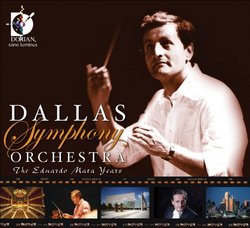| All Artists: Eduardo Mata, Dls Title: Eduardo Mata Years Members Wishing: 0 Total Copies: 0 Label: Dorian Recordings Original Release Date: 1/1/2010 Re-Release Date: 4/27/2010 Genre: Classical Style: Symphonies Number of Discs: 6 SwapaCD Credits: 6 UPC: 053479210920 |
Search - Eduardo Mata, Dls :: Eduardo Mata Years
 | Eduardo Mata, Dls Eduardo Mata Years Genre: Classical
|
Larger Image |
CD DetailsSimilar CDs
|
CD ReviewsA fitting tribute to the late Mexican master goodmusicman | USA | 06/15/2010 (5 out of 5 stars) "This 6-CD set devoted to recordings by the Dallas Symphony Orchestra conducted by Eduardo Mata (born 1942, died in a plane crash in January 1995) is a fitting tribute to the conductor who brought the DSO to international status and raised its playing to the level of the "official" top 5 US orchestras (New York, Boston, Cleveland, Philadelphia, and Chicago). Mata's repertoire was diverse and he specialized in Latin music, having been a pupil of the dean of Mexico's composers, Carlos Chavez. This set features all "mainstream" repertoire staples, mostly from the 20th century, and it demonstrates just what an amazing podium talent Mata was. A summary of the 6 CDs follows:
Disc 1: Stravinsky's Rite of Spring and Prokofiev's Scythian Suite. The Prokofiev is given a fierce performance with particularly virtuosic brass playing. The Rite is given a much slower and more thoughtful performance than most. Those looking for savagery should look elsewhere (e.g. Gergiev or Bernstein) but this performance demonstrates that this is indeed MUSIC and should be carefully shaped and played with precision. That is what Mata and the DSO do here and the sound is about as good as it gets, eclipsing almost all other Rites on CD in sound quality. It is a worthy alternative take on this oft-recorded warhorse, and features none of the awkwardness with Stravinsky's idiom that is found in Karajan's second recording with the Berlin PO. Disc 2: Shostakovich's Leningrad Symphony (No. 7). Mata's performance is one of the most straightforward and direct I have ever heard. The lyrical sections sound really beautiful and the climaxes (especially the one at the end of the first movement march and the one at the end of the symphony) are very powerful. The DSO's playing is flawless. Kurt Masur conducted a similarly conceived Leningrad with the NY Phil, but his account sounds boring compared to Mata's and Mata has far superior sound quality. This would not be my first-choice Leningrad, but it is an excellent alternative to more red-blooded (Gergiev) and gut-wrenching (Bernstein/Chicago) accounts. Disc 3: Prokofiev's Alexander Nevsky and Shostakovich's Ninth Symphony. The Nevsky is easily one of the very best modern recordings on disc, together with the Abaddo/Chicago recording, but with far superior sound. Mata's reading is bold and exciting and the "Battle on the Ice" is especially impressive. The vivid sound and powerful performance make this reading a first-choice for those interested in this work. The Shostakovich Ninth is given a straightforward Neo-Classical reading, in the vein of Prokofiev's "Classical Symphony," but with more sarcasm. Mata does not attempt to inject edginess into this performance, following Shostakovich's intention to write a small-scale Neo-Classical work when everyone was expecting a grand post-war symphony. The playing of the DSO and the vivid sound make this a first choice Shostakovich 9, and makes this disc one of the best in the set. Disc 4: Bernstein's On the Waterfront Suite, Harris's Third Symphony, Copland's Billy the Kid. The Bernstein is given a less brash performance than Bernstein's own NY Phil recording on Sony, which at first may seem tame. But listen again and you'll hear that Mata has the full measure of the work, with very beautiful lyrical sections and powerful action music, in top-notch sound. The Harris Third is one of the great ones: not as good as Bernstein's 1961 recording, but better than digital recordings such as Jarvi and Alsop and on a par with Bernstein's 1985 DG recording, but less emotive. The Mata sound is better than the Bernstein 1985 sound, but not perfect. Mata's reading is, as usual, straightforward. He doesn't give the music added weight that's not already in the score (as Bernstein 1985 does) and he allows the long lines to breathe naturally. Anyone who appreciates this, one of the greatest of American symphonies, must hear Mata's performance. The Billy the Kid is given a less jaunty reading than Bernstein's 1960s Sony reading, but I enjoy it more. Under Mata's direction, it sounds like a great American ballet, not like "wild west" music. The main theme is given a broad and deeply moving reading, while the bass drum in the faster sections is vividly up-close. The recorded sound is very pleasing. Disc 5: Chausson's Symphony in B Flat, Ibert's Divertissement and Ports of Call. The Chausson reading may be the best performance on this entire set, an urgent, sweeping performance that does not wallow in the first movement's luxurious climaxes, but which conveys the symphony's poetic beauty better than any other modern recording, including my previous favorite, Tortelier on Chandos. The sound quality is absolutely perfect (the best on this set) and the playing of the DSO is beyond virtuosic. A real keeper. The Ibert works are given very colorful and bouncy readings, bringing out all the humor and "fun" in this music. With outstanding recorded sound, these are the benchmark recordings of these works on disc. This CD alone is worth the price of the set. Disc 6: Respighi's Pines of Rome, Roman Festivals, and Brazilian Impressions. The Pines is the best modern recording (only Reiner/Chicago eclipses this one), with powerful brass, pounding bass drum in the finale and spot-perfect tempos. The sound quality is demonstration quality. Roman Festivals is given a bold performance, very exciting and theatric. It can be anyone's first choice. Brazilian Impressions is the most compelling performance I've heard, better than Lopez-Cobos and Faletta. It is a very atmospheric and exotic performance, with all the orchestral colors brought out in full force. The sound is first-class. In summation, this set is a testament to Mata's abilities as a conductor. He is never showy or flashy for the sake of self-indulgence. He lets the music breathe when it needs to and lets it roar when it should. Some of these performances are first-choices while others make excellent alternative readings. With remastered sound and near-budget price, this set is a must. The deluxe package includes notes on the orchestra, conductor, and each of the works. Although it represents only a fraction of Mata's recorded legacy, it is ample demonstration of what the world of classical music is now missing." |

 Track Listings (18) - Disc #1
Track Listings (18) - Disc #1

